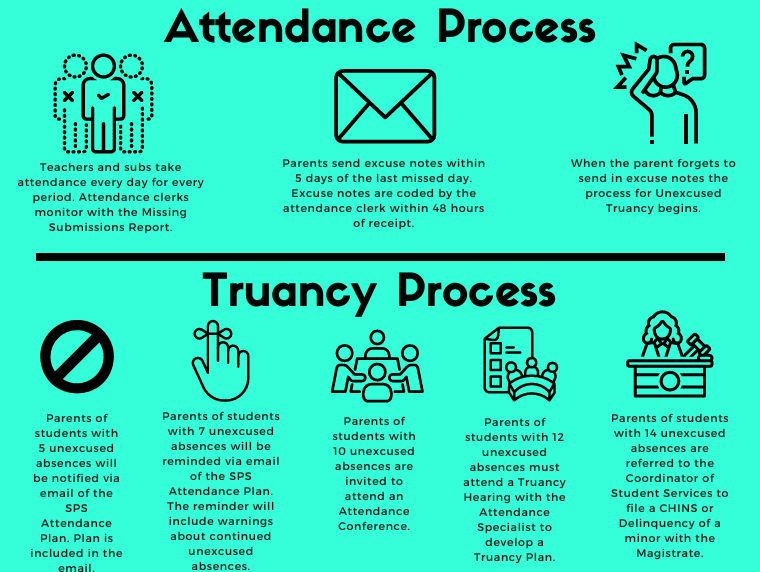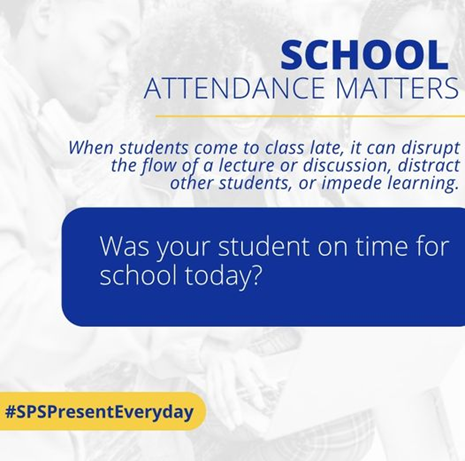Absences
-
-

Despite the excellent cooperation most of you have shown and despite the considerable efforts exerted by the division, truancy – that is, the failure to attend school except for a valid reason – remains a serious problem for some of our students. As you know, truancy often leads to academic failure, dropping out of school, crime in the community, and many other problems. For those reasons, Virginia law requires that school-age children attend school, and it requires that parents make sure their children attend school. The law also requires that the school file legal proceedings against every parent and child who fails to comply with Virginia’s compulsory attendance laws. To assist you in your parental and legal duties, and for us to comply with the laws, we are initiating a program and protocol to address truancy.
DAILY ABSENCES:
Calls will be made via the automated calling system to notify the parent/guardian by telephone the day the student is absent from school. Even if the parent/guardian notifies the school that his/her child will be absent, the telephone call from the school will still be made.ADDITIONAL ABSENCES:
When a student accumulates five (5) unexcused absences, parents will be emailed an Attendance Plan developed by Suffolk Public Schools. Notification of the requirement to adhere to the attendance plan will be sent each Wednesday to the email address of the students' primary guardian.EXCESSIVE ABSENCES:
At the seventh (7) absence, families will automatically receive an email reminder that they are required to adhere to the Attendance Plan sent previously. The email will also include that parents will be required to attend an Attendance Conference if the student acquires 10 unexcused absences. On the tenth (10) unexcused absence, families will be notified that they must attend an Attendance Conference, either virtual or face-to-face. Meetings must be held even if parents or guardians do not show. Parents/guardians will receive documentation of the meeting via mail. On the twelfth (12) unexcused absence, the parents and student must attend a meeting with the Truancy Team located at the courthouse to develop a plan to provide resources, support, and expectations for the parent and student to improve attendance. Additional absences could result in a request that the Juvenile and Domestic Relations Court be notified. Parents may be served with a warrant for failure to obey the Compulsory School Attendance Law.It will remain our policy that any student who has more than 20 unexcused absences during a school year must repeat the year unless there are extraordinary circumstances. Should you have any questions or concerns about these policies and procedures, please do not hesitate to contact Mr. LeFevre; he will be pleased to discuss any of this with you. We all share the same interest in seeing your children receive a quality education that enables them to compete and succeed in our increasingly competitive and challenging world.
-
school Attendance Matters!
-
-
School attendance is essential to student learning and achievement in Suffolk Public Schools. When students are present, they are more likely to stay on track and progress academically, have more substantial social and peer connections, learn positive life skills, and have a better opportunity for an improved quality of life. Repeated absences from school can adversely affect your student's achievement.
Tardiness can also impact student learning. When students come to class late, it can disrupt the flow of a lecture or discussion, distract other students, and impede learning. To combat tardiness, practice establishing a "school prep" routine, such as taking out clothes, prepping lunches, and packing backpacks the night before to help your student arrive on time. Our students, staff, and parents must work together to reduce chronic absenteeism and tardiness. We cannot stress enough the need to be present in school every day and how student attendance directly impacts your student's success.
The U.S. Department of Education defines chronic absenteeism as when students miss 10% or more of the total number of days enrolled during the school year. In a 180-day school year, 18 days of absence on average can impact a school's accreditation status. Suffolk Public Schools recognizes the following categories of absences that contribute to chronic absenteeism: Excused or unexcused absences for any reason, absences before involuntary withdrawals (i.e., suspension), absences for virtual learning, and absences for students placed in full-time facilities based on actual attendance data.
Missing lessons affect student learning, ultimately impacting academic achievement and advancement. Poor attendance can also affect social and emotional development. For example, students who are chronically absent in the early years of their education may not learn crucial school-readiness skills and abilities such as critical thinking and problem-solving. Middle and high school students who are chronically absent have a significantly higher dropout rate. When students improve their attendance rates, they improve their academic prospects and chances for graduation and promotions.

-

